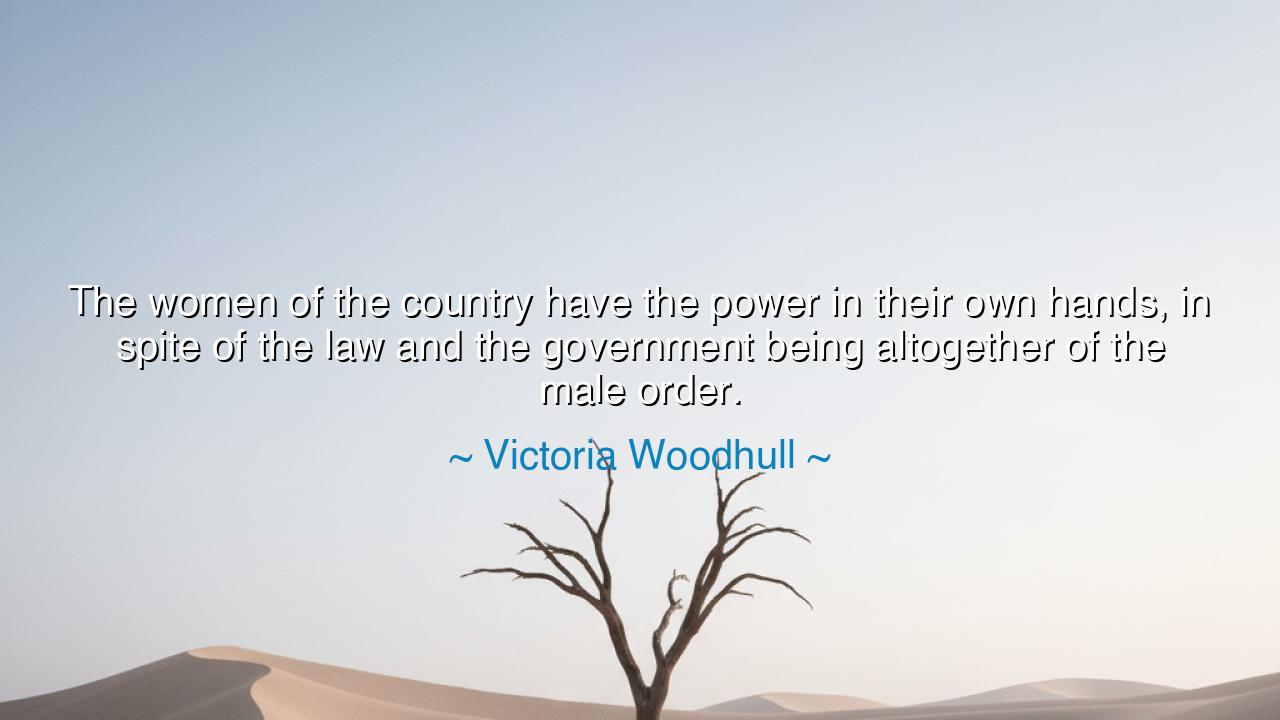
The women of the country have the power in their own hands, in
The women of the country have the power in their own hands, in spite of the law and the government being altogether of the male order.






When Victoria Woodhull declared, “The women of the country have the power in their own hands, in spite of the law and the government being altogether of the male order,” she was not merely making a statement of defiance — she was summoning the eternal spirit of feminine strength that has endured, silently and steadfastly, through every age of human history. Her words burned like fire in an age when women were denied the right to vote, own property, or govern their own destinies. Yet even then, she saw what others could not: that power is not given by law, but born from within. The laws of men could restrain the hand, but they could never silence the soul.
The origin of this quote lies in the heart of Woodhull’s revolutionary life. Born into poverty in 1838, she rose to become a trailblazer of women’s rights, a stockbroker, a journalist, and in 1872, the first woman ever to run for President of the United States. Her statement emerged during her fight for women’s suffrage and equality — a time when the world dismissed women’s voices as fragile and unfit for power. Yet Woodhull understood that women already wielded a deeper authority than the law could measure: the power to influence, to nurture, to educate, to unite, and to inspire. While the government was of the male order, she believed the moral order of the world was sustained by women — the invisible strength that holds civilization together.
In the style of the ancients, Woodhull’s wisdom recalls that of the matriarchs and prophets of old — the women who, though denied crowns or armies, shaped nations through courage and conviction. Her words might have been spoken beside the Delphic Oracle, or written in the scrolls of Hypatia of Alexandria, the philosopher who defied the patriarchs of her time to teach truth and reason. She echoes a timeless truth: that law does not create power; it merely recognizes it. And when the law refuses to recognize the just, it is the duty of the powerful — even the powerless — to rise and make their strength known.
History offers countless mirrors of this truth. Consider Harriet Tubman, born enslaved, denied every right by the laws of her land. She possessed no title, no wealth, no permission from any government. Yet she led hundreds to freedom, guided only by her courage and her unyielding belief in human dignity. The law was against her, but justice was not. Tubman’s strength, like Woodhull’s, was proof that the true power of women has never depended on the approval of men. It flows from conviction, from compassion, from the quiet and fierce resolve to build, to protect, to heal, and to lead when others falter.
Woodhull’s words also speak to the moral awakening of societies. She knew that laws could not forever stand against the tide of conscience. A nation that denies equality denies its own future, for every generation draws its first strength from the arms of its mothers, its teachers, its sisters. When women are silenced, the wisdom of half the human race is lost; when they rise, humanity itself rises with them. In saying that “women have the power in their own hands,” Woodhull was not predicting rebellion, but renewal — a transformation that begins when women believe in their inherent worth and act upon it.
Her statement carries a heroic defiance, but also a sacred tenderness. She does not call for domination, but for harmony — for the recognition that men and women are two forces of one creation, equal in spirit and destiny. The “male order” of government, as she called it, was not a natural law but a temporary imbalance, one that could be corrected not through vengeance but through enlightenment. By speaking, by organizing, by claiming their place in public life, women would not destroy the order of society — they would redeem it.
The lesson of Victoria Woodhull’s words is as vital now as it was then: power lies in awareness. Every woman — and every man who values justice — must understand that rights are not gifts from authority but expressions of human truth. To awaken to one’s own power is to change the course of history. Woodhull’s call to “mobilize the power in your own hands” remains an anthem for all who face oppression: speak even when told to be silent, act even when told to wait, and believe even when the world doubts you.
So let her words echo through the ages as a teaching for all generations: the laws of men may shape nations, but the courage of women sustains them. Power need not wear a crown to change the world — it need only believe in itself. And when those once silenced lift their voices together, no government, no prejudice, no “male order” can stand against the enduring truth that freedom belongs to all who dare to claim it.






AAdministratorAdministrator
Welcome, honored guests. Please leave a comment, we will respond soon